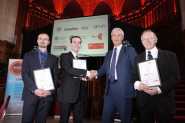Students, staff and recent graduates were competing not just for the money to advance their ideas but also the free advice and managed office space up for grabs at the Bristol SETsquared Centre, which will help to help bring the winning ideas to the marketplace.
The overall winner was Avishek Banerjee, a teaching assistant in the Department of Mechanical Engineering, with his business idea SunHub which looks to provide sustainable lighting to the poorest communities in rural India.
Small solar panel charging stations set up in communities can provide enough electricity to charge low power LED lanterns, giving customers a higher quality lighting service at a lower price than the existing kerosene lamps used.
Avishek, who won £12,750, said: “I'm thrilled to have won. Just writing the proposal made the competition worthwhile, but the fact I won is great.
“I'd been researching energy systems for Indian rural villages for a while and my work had shown how good this solar lighting scheme was compared to a lot of the other options.
“In August I'm heading to Laos for six months to work with an NGO that operates a similar system. That will give me a lot of experience with what’s actually required to put this into practice. Coupled with the money, it should put me in a good position to give SunHub a try.”
The second-place winners were Spyglass Technologies which has developed a novel, low-cost and user-friendly Atomic Force Microscope (AFM), which is considerably cheaper than the nearest competitor and requires no special training to operate.
Spyglass is the business idea of Oliver Payton, who is studying for a PhD in Engineering Mathematics, Dr Loren Picco and Professor Mervyn Miles, who both work in the School of Physics.
They won a cheque for £7,250, plus £2,000 in legal support from law firm Osborne Clarke, and six months free support from the SETsquared Business Acceleration Centre in the University.
They plan to market this AFM to existing users but most importantly, they will target new users in the university education and research environments which the existing AFM industry has failed to service due to the high cost and complexity of current products.
In joint third place were William Goodwin, a final year civil engineer, and Mark Caldwell, a final year computer scientist.
William’s idea, EventBand, uses Radio Frequency Identification (RFID) wristbands to provide proof-of-identity and cashless payment systems for festivals.
Mark’s idea, ChirpID, is a smartphone application using novel technology to identify bird species from audible birdsong.
Each won packages totalling £5,000 including offers of legal support and business acceleration advice.
The winners were announced at the University of Bristol’s Enterprise Dinner, organised by the Research and Enterprise Development (RED) department to inspire new high-growth business ideas and entrepreneurial talent.
This year’s competition entries were judged by a panel of industry experts from sponsoring organisations including Bristol City Council, Deloitte, EADS, Jones Lang LaSalle, IP Group, Motorola, Osborne Clarke, Santander, SETsquared Business Acceleration Centre (Bristol) and Wyvern Seed Fund.
Dave Jarman, Enterprise Skills and Education Manager at RED and chair of the competition judging panel, said: “The diversity of ideas and quality of the entries in this year’s competition was astounding. The University is getting better and better at translating our bright ideas into viable businesses.”
Another important development was also rewarded at the Enterprise Dinner with Professor Marianne Thoresen, from the School of Clinical Sciences, winning the inaugural Vice-Chancellor’s Impact Award for her ground-breaking research into the cooling of newborn injured brains.

